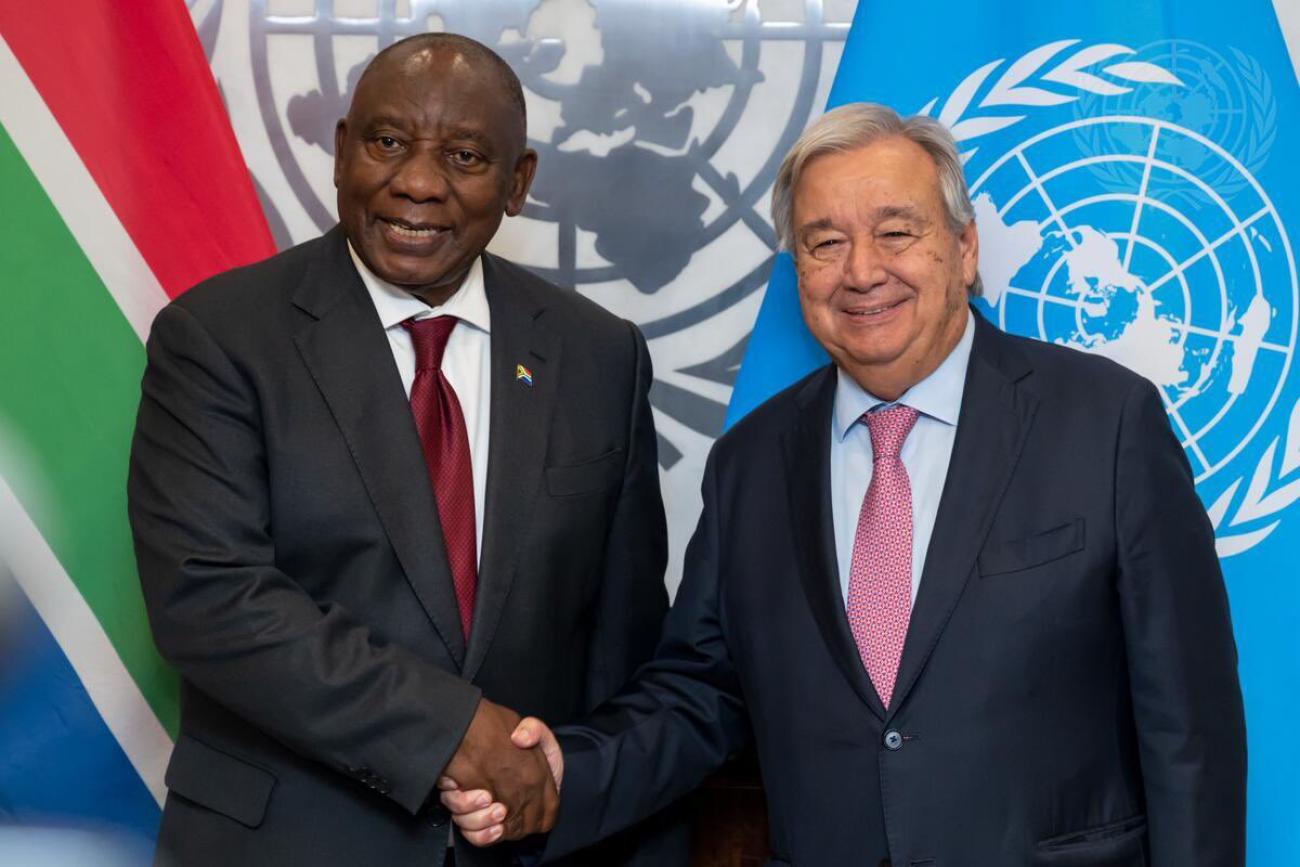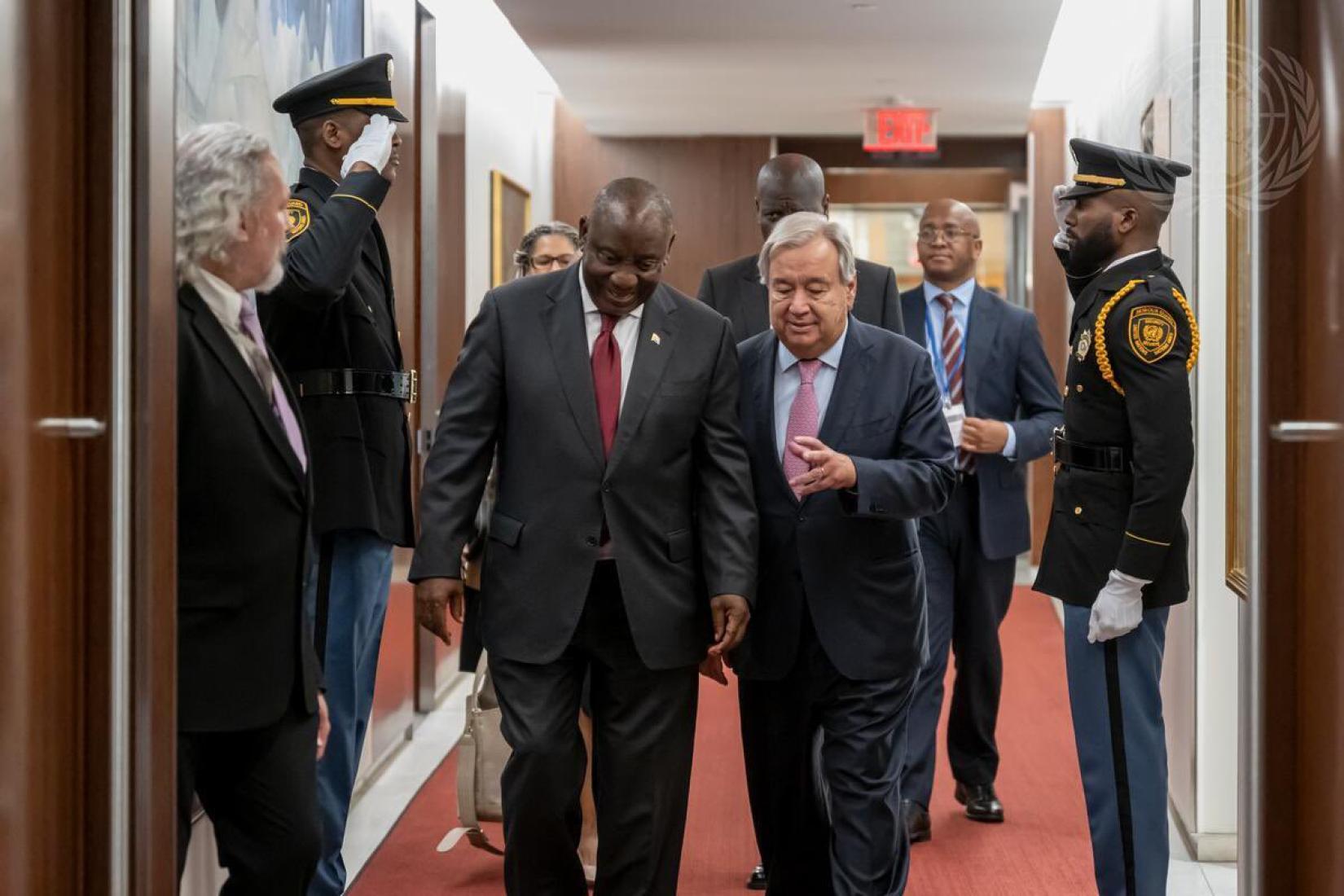UN Secretary-General’s meeting with H.E. Mr. Cyril Ramaphosa, President of the Republic of South Africa in New York

The UN Secretary-General and the President Cyril discussed outcomes of the Summit of the Future and the defining role played by African countries in the process
The Secretary-General met on Sunday, 22 September 2024 with H.E. Mr. Cyril Ramaphosa, President of the Republic of South Africa. The Secretary-General and the President discussed the outcome of the Summit of the Future and the defining role played by African countries in the process. The Secretary-General and the President also raised other topics of common interest, in particular, in connection with South Africa’s presidency of the G20 in 2025.
The President also attended the Summit of the Future, a high-level event, bringing world leaders together to forge a new international consensus on how we deliver a better present and safeguard the future. Effective global cooperation is increasingly critical to our survival but difficult to achieve in an atmosphere of mistrust, using outdated structures that no longer reflect today’s political and economic realities.
World leaders adopted a Pact for the Future that includes a Global Digital Compact and a Declaration on Future Generations. The Pact covers a broad range of themes including peace and security, sustainable development, climate change, digital cooperation, human rights, gender, youth and future generations, and the transformation of global governance.
The Pact along with its annexes, the Global Digital Compact and the Declaration on Future Generations, was adopted by consensus, despite a last-minute proposal for an amendment by some countries, including Russia, Iran, the Democratic People’s Republic of Korea (DPRK) and Syria.
The amendment sought to incorporate text calling for non-intervention in any issue of national sovereignty, and the primacy of intergovernmental deliberation, in effect, downplaying the role of the civil society or private sector interests. It was rejected after the 193-member Assembly decided not to act on the proposal.
Pact for the Future
The Pact’s five broad focus areas include: sustainable development; international peace and security; science and technology; youth and future generations and transforming global governance. This has become an urgent pivot, as multilateral financial institutions and even the United Nations itself have come up short seeking solutions to 21st century problems, the pact lays out. By endorsing the Pact, UN Member States pledged, among other things, to:
- Turbocharge the Sustainable Development Goals (SDGs) and the Paris Agreement on climate change, two landmark 2015 agreements that have seen halting progress and missed milestones
- Listen to young people and include them in decision-making, at the national and global levels
- Build stronger partnerships with civil society, the private sector, local and regional authorities and more
- Redouble efforts to build and sustain peaceful, inclusive and just societies and address the root causes of conflicts
- Protect all civilians in armed conflict
- Accelerate the implementation of our commitments on women, peace and security
Global Digital Compact
The Global Digital Compact marks the first truly worldwide agreement on the international regulation of artificial intelligence (AI) and is founded on the idea that technology should benefit everyone. It outlines commitments to ensure that digital technologies contribute to sustainable development and human rights, while addressing risks like digital divides, cybersecurity, and misuse of technology. The Compact aims to bridge the digital divide and ensure AI technologies are used responsibly, fostering global cooperation on both AI capabilities and security threats. Governments are also obligated to form an impartial worldwide Scientific Panel on AI and start an international conversation about AI governance inside the UN.


















